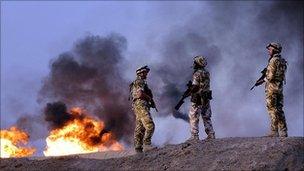Iraq inquiry 'has low standards of questioning'
- Published

The public wants more transparency over the Iraq war, it is claimed
The Iraq inquiry has been "too easygoing" in grilling witnesses about the lead-up to the war, a former UK diplomat has said.
Carne Ross told the BBC that chairman Sir John Chilcot was running a "narrow" investigation, with the standard of questioning "pretty low".
Mr Ross alleges that the Foreign Office withheld key documents before he gave evidence to the inquiry recently.
But Sir John has promised an "open, thorough and fair process".
The inquiry will hear on Tuesday from Hans Blix, the former United Nations chief weapons inspector in Iraq.
Sir John and his colleagues are coming towards the end of their public evidence sessions, with a report expected to be published around the end of the year.
'Partial view'
Mr Ross, the UK's Iraq expert at the United Nations from 1997 to 2002, says the Foreign Office withheld documents relating to the build-up to the 2003 invasion which he requested ahead of appearing before the inquiry earlier this month.
These allegedly include one about a visit to Syria by former Prime Minister Tony Blair and another on the failure to deal with a pipeline he said enabled Iraq to illegally export oil through Syria.
Mr Ross also says he was urged by a Foreign Office worker not to refer to a memo to the special adviser to the then Foreign Secretary, Jack Straw, expressing concern that a briefing paper for Labour MPs and peers had altered the assessment of Iraq's nuclear threat.
He told the BBC the Chilcot inquiry was not doing enough to ensure it got a full picture of events.
Mr Ross said: "The other government witnesses are giving a partial view... I think that the standard of interrogation by the panel is pretty low. The level of questioning is very easygoing.
"In particular my greatest concern is that witnesses are not being challenged on the contradictions between what they are saying to the panel and what's in the documents."
Mr Ross said he found the situation "very troubling", adding: "Chilcot says he's got full access to documents. My concern is how can they find their way around this vast number of documents without people [helping them]? I tried to get access to the documents. I was not given full access."
He went on: "It's clear he's not concerned about openness. He doesn't see this as an exercise in government transparency.
"He's taking a very narrow view that it [the inquiry] is only there to learn lessons, while there's a much stronger public pressure for transparency."
'Authoritative'
An Iraq inquiry spokeswoman declined to comment on Mr Ross's criticisms.
At the resumption of witness hearings in June, following a break for the general election, Sir John said: "We remain committed to a transparent, open, thorough and fair process and conducting the inquiry in a cost-effective way.
"We intend to deliver a reliable and authoritative report about the UK's decision to take military action in Iraq and the events that followed; and to identify lessons for the future. "
A Foreign Office spokesman has said: "We are not going to comment on what witnesses have said, why the inquiry has called them, or what their lines of investigation should be.
"These are matters for the independent inquiry to determine."
Mr Ross resigned from the Foreign Office in 2004, and is now executive director of the Independent Diplomat advice group.
The Iraq inquiry is looking at the UK's role in the build-up to the war and the handling of its aftermath.
- Published20 July 2010
- Published19 July 2010